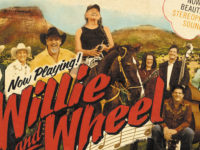 NICK DERISO: Asleep at the Wheel has ensured that Texas swing music is no museum piece.
NICK DERISO: Asleep at the Wheel has ensured that Texas swing music is no museum piece.
In fact, they can be downright postmodern — recording, on occasion, with the likes of Manhattan Transfer and the Squirrel Nut Zippers, while paying tribute to Lone Star musical legend Bob Wills.
A nifty mix of this hipster, if archaic, regional music and a host of eclectic new sounds, the 8-11 piece outfit has changed members (at last count, 80 people had passed through the group’s ranks) as often as it’s changed 10-gallon hats.
“It is amazing to me at this point compared to 1970 when I started the band,” said founding member Ray Benson, a baby boomer. “My whole intent was to bring the music back to my generation. We’ve done what we set out to do and it’s just grown. Now, we have a whole new generation doing it, and we have a whole new band.”
They recently wrapped the aptly named Last of The Breed tour, featuring Willie Nelson, Merle Haggard and Ray Price. Yet Benson and Co. are anything but nostalgic, having never abandoned a sturdy, still-pleasing foundation of freewheeling fun.
Nine Grammys have followed, as has acclaim from all corners — most recently for the celebrated collection of originals “Reinventing the Wheel.”
 “It’s come full circle,” said vocalist Elizabeth McQueen, “and it’s back to that original review concept of Asleep at the Wheel, with lots of different styles of music and different singers trading off, which makes it really great.”
“It’s come full circle,” said vocalist Elizabeth McQueen, “and it’s back to that original review concept of Asleep at the Wheel, with lots of different styles of music and different singers trading off, which makes it really great.”
Benson — a can’t-miss 6-7 guy with a booming baritone — formed the band in West Virginia around 1970 with the now-departed Lucky Oceans, and at first they played straight country. A stirring spin through Merle Haggard’s tribute album to Texas swing legend Bob Wills and then the ear-bending country of Commander Cody and His Lost Planet Airmen changed all of that, though.
Asleep at the Wheel would bridge the old Texas vibe with the then-emerging sounds of their new adopted home of Austin, Texas, where Willie Nelson and Doug Sahm had begun helping to craft what became known as outlaw country.
“We started out as a roots band, and Western swing was just one of the kinds of roots music that we did,” Benson said. “But the demand for Western swing is what really moved us in that direction. Of course we love to play it, but we are really a Western swing band by instrumentation — fiddle, steel guitar — and by look, with the cowboy threads and boots and stuff. Within that context, you can play any music.”
After being mentioned by Van Morrison in Rolling Stone magazine, the band was signed to its first big-label deal. Asleep’s self-titled 1974 debut produced their first charting single, a cover of Louis Jordan’s “Choo Choo Cha-Boogie.”
A year later, “The Letter that Johnny Walker Read” went Top 10. In 1977, Rolling Stone named the group its top country and western band. The end of the decade saw the release of “Served Live,” a concert recording done in Austin.
After a largely dormant period to begin the 1980s, Asleep roared back in 1987 with “10.” That album, and its follow up “Western Standard Time,” both garnered Grammy awards. Several key members dropped out along the way: Chris O’Connell was working as a veterinarian’s assistant in Virginia, while Leroy Preston left to become a data processor in Vermont.
The band kept going, and going.
Asleep scored a hit with a 1993 tribute to Bob Wills (featuring the Grammy-winning instrumental “Red Wing”), and a 25 th anniversary recording “The Wheel Keeps On Rollin’.” A second concert recording, “Live at Billy Bob’s” was released in 2003, followed by the acclaimed “Kings of Texas Swing,” which earned six Austin Music Awards.
Asleep’s Benson emerged as a star in his own right along the way. In 2004 he succeeded classical pianist James Dick as the state musician of Texas, and released a belated solo recording called “Beyond Time,” which features a terrific cover of Marty Robbins’ “El Paso” with Flaco Jimenez. He even composed a musical, also in tribute to Wills, called “A Ride With Bob.”
Wills, it’s clear, is not simply an inspiration as a Texas musician, but also as a frisky experimenter — a vibe that continues to define Benson’s band.
“He had a style, but the music was whatever the people wanted; he would play Glenn Miller stuff, Bessie Smith stuff, Jimmie Rodgers stuff — whatever they wanted,” Benson said. “But the instrumentation defined the sound. And that’s what Asleep at the Wheel is: we took Bob’s model, and then made it our own.”
- Nick DeRiso’s Best of 2015 (Rock + Pop): Death Cab for Cutie, Joe Jackson, Toto + Others - January 18, 2016
- Nick DeRiso’s Best of 2015 (Blues, Jazz + R&B): Boz Scaggs, Gavin Harrison, Alabama Shakes - January 10, 2016
- Nick DeRiso’s Best of 2015 (Reissues + Live): John Oates, Led Zeppelin, Yes, Faces + others - January 7, 2016



